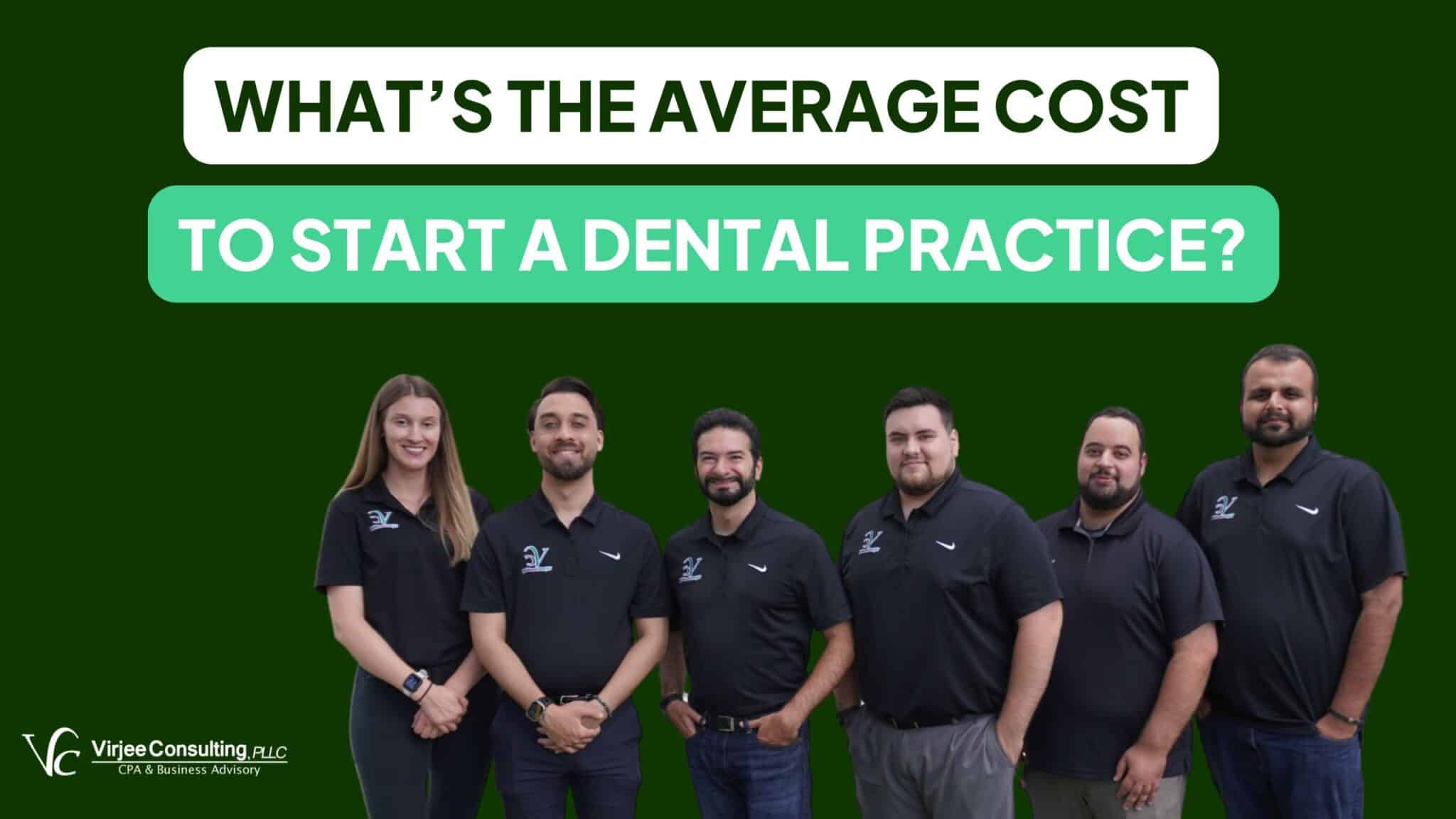Starting your own dental practice is exciting—it’s the moment where you finally get to shape the environment, culture, and patient experience exactly how you envision it.
But while the dream of having your own practice is motivating, the reality of making it happen comes with some serious costs that go far beyond finding the right location and picking out equipment.
From the price of dental chairs to the cost of building out treatment rooms, you’ll be making big financial decisions at every step. And financing—well, that’s a whole other story.
In this article, we’ll break down the costs you’ll need to cover when starting your practice from scratch, including equipment, location, staffing, and technology. Plus, we’ll look at your financing options to help you make the most of your investment and get your dream practice off the ground.
Here are the key components to consider.
Key Components of Dental Practice Startup Costs
As experienced dental accountants, we’ve worked with hundreds of dental practices opening their doors.
On average, the cost to start a dental practice in 2024 typically falls between $400,000 and $600,000, though it can vary based on factors like location, size, and equipment choices.
Here’s a breakdown of the primary costs you can expect:
1. Location and Real Estate
Choosing the right location for your dental practice isn’t just about finding a spot with lots of patients—it also plays a big role in shaping your future lifestyle.
Urban areas, like Dallas or Houston, might seem appealing because of the high patient traffic, but they also come with higher rent and more competition.
On the other hand, suburban or rural areas tend to have lower rent, which can help reduce your startup costs. For example, in cities, commercial rent can range from $30 to $50 per square foot, or even more in prime areas. But in rural spots, you might only pay $15 to $25 per square foot, giving you some financial breathing room.
According to the American Dental Association (ADA), rural practices often have much lower overhead costs as well—sometimes as low as 50% of revenue. In cities, that number can jump to 75-80%. Plus, with a lower cost of living in rural areas, your paycheck stretches further.
Many dentists who choose rural locations also find they enjoy a better work-life balance, with less stress and fewer competitors.
2. Dental Equipment
Equipping your practice with the necessary dental equipment is one of the largest upfront costs you’ll face. High-quality dental chairs, X-ray machines, sterilization units, and delivery systems alone can run between $150,000 to $250,000.
For example, an advanced digital X-ray system can cost around $10,000 to $15,000, while dental chairs range from $5,000 to $10,000 each, depending on features and quality.
Don’t forget to include smaller but essential tools like curing lights, handpieces, and autoclaves, which can quickly add up.
Additionally, plan for another $30,000 to $50,000 for patient management software and diagnostic tools to run the practice smoothly.
3. Office Furniture and Fixtures
Beyond the dental operatory, creating a welcoming and functional office space is key to patient comfort. Furnishing your waiting room with comfortable seating, reception desks, and cabinetry can cost between $15,000 to $30,000.
For example, quality reception desks alone can cost around $2,000 to $5,000, while ergonomic seating for the waiting area can run about $150 to $300 per chair.
Prioritize durability and patient comfort, as this will impact your patients’ first impressions.
4. Licenses, Permits, and Legal Fees
Dealing with the legal paperwork might not be the most exciting part of starting your dental practice, but it’s definitely necessary.
Depending on how you set up your business—whether it’s a sole proprietorship, partnership, LLC, or corporation—you’ll have different legal and regulatory requirements to meet at the local, state, and federal levels.
You’ll also need to make sure you’re handling medical waste disposal properly, which means following specific waste management rules.
On top of that, you’ll need to register with the Drug Enforcement Administration (DEA), get a National Provider Identifier (NPI) number, and secure any other necessary licenses from your local authorities.
Legal consultations, filing fees, and permits can add up, so expect to spend anywhere from $10,000 to $20,000 to cover these costs.
While it may feel like a lot, it’s necessary to get everything in order from the start so you can focus on what really matters—running your practice!
5. Staffing and Payroll
Hiring skilled dental staff is key to running a successful practice. Salaries can vary depending on your location, but here’s a general idea of what to expect:
- Dental Hygienists – $105, 560 (around $51/hour)
- Dental Assistants – $73,526 (around $22/hour)
- Front Office Staff – $64,809 (around $18/hour)
It’s important to offer competitive pay to attract and keep quality staff, especially if you’re in a busy city, like Houston, where the demand for skilled workers is higher.
6. Marketing and Branding
Getting the word out is a must when you’re starting a new practice. It’s not enough to just hang a sign out front—patients need to know you exist. That’s where marketing comes in.
A solid online presence is key, which means having an active social media profile, a professional website, and showing up when people search for a dentist in your area (that’s where local SEO comes in).
You’ll likely spend between $15,000 to $30,000 on things like branding, website design, and your first round of advertising. For example, building a professional website usually costs around $7,000 to $10,000, and running digital ads—like those you see on Google or Facebook—can cost about $1,000 to $3,000 per month, depending on how aggressive you want to be with your outreach.
It might seem like a big investment, but getting your name out there early is the best way to build a steady flow of patients.
7. Working Capital
Once you open your doors, it might take a little time before patients start rolling in consistently. That’s why having some extra cash on hand is super important to cover all the basics—rent, utilities, payroll, and any other bills that don’t stop just because things are slow at the start.
A good rule of thumb is to have at least $50,000 to $100,000 set aside to keep things running smoothly for the first six months. This buffer will give you peace of mind while you build up your patient base without stressing about making ends meet.
Funding Your Dental Practice
Starting a practice of this magnitude will almost always require financing. Common options include:
- Small Business Loans (SBA): These loans are backed by the government, making them more accessible and often more affordable. They usually come with favorable terms and interest rates for dentists.
- Traditional Bank Loans: These can provide larger amounts of capital, though they tend to come with stricter qualification requirements, including a high credit score and significant collateral.
- Lines of Credit: These offer more flexibility by allowing you to borrow only what you need, which can be particularly helpful for covering unexpected costs or maintaining cash flow.
To qualify for any loan, lenders will consider your personal credit score, current income, savings, and debt history.
Note: Working with a dental accountant can help you prepare the necessary financial documentation and improve your chances of securing funding.
Need Help With the Costs of Opening Your Dental Practice?
Starting a dental practice can feel overwhelming, especially when you look at the numbers.
But with the right support, it’s an exciting and completely achievable goal!
Here at Virjee Consulting, we’ve helped hundreds of dentists successfully navigate every step—from choosing the right location and securing financing to budgeting and forecasting for the future. (Just check out our 150+ reviews on Google!)
If you’re ready to take the next step, just fill out our contact form, and we’ll get back to you within one business day.
We’re here to make the process smoother and take the stress out of practice building.
Let’s chat and see how we can help you get started!
Until next time!

